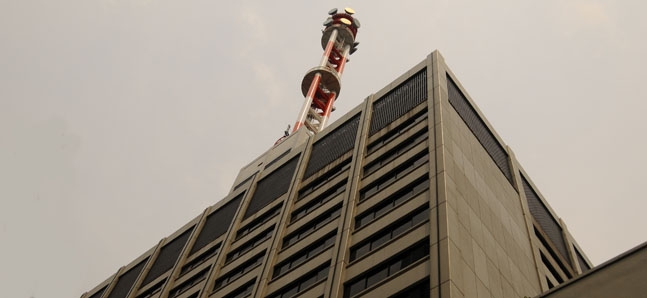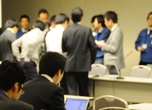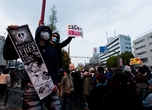What lies in store for the 'docile Japanese'?
Shin Yabuki calls for his countrymen to take a stand

Posted: 月 5 23 2011
With around 80,000 people in long-term evacuation from the stricken Fukushima area, and widespread damage to local businesses, the cost of compensation is expected to be somewhere between 5 to 10 trillion yen. Given that TEPCO is unable to pay out such huge compensation from its profits alone, the Japanese government announced a provisional support plan on May 13. Yet, incredibly, rather than give priority to the interests of the citizens of Japan, the compensation scheme chose to protect the company responsible for the accident, its investors and the banks that finance it.
Under current legislation, TEPCO would be exempted from liability in the case of an ‘unusually large natural disaster’. But for reasons including the fact that the nearby Fukushima Daini nuclear plant was able to achieve cold shutdown in the normal manner, it doesn’t seem that the power company will fall under the exemption clause.
Since TEPCO is unable to cover compensation costs, the best countermeasure would be to sell off its assets. In the financial year ending March 2010, TEPCO’s non-nuclear electric power facilities, which include thermal power plants, had a book value of around 1.8 trillion yen, and its facilities for electric power distribution, which includes the power grid, were valued at 5.4 trillion. This means that if TEPCO sold its distribution network at its book value, even if the compensation expenses reached 10 trillion, more than half of the costs would be covered. It is only natural that a company responsible for an accident would raise the capital for compensation payments through sacrificing parts of its operations.
The sale of assets like power plants would mean that we could separate the generation and transmission of electricity, something that hasn’t been achieved so far in this country because of opposition from power companies like TEPCO. Competition in the electricity market could lead to a fall in Japan's expensive electricity rates, which would also aid the business community.
At present, the regional monopolies of Japan's power companies are almost completely unchallenged, so there is nowhere else for customers to go. Even if TEPCO went bankrupt, the core value of its business before and after would not be harmed. When Japan Airlines filed for bankruptcy protection in January 2010 under the Corporate Rehabilitation Law, there were other rival companies to compete for its customers, but we are not in that kind of situation here. After selling off its assets, TEPCO could be made to go through bankruptcy procedures, while shareholders and financial creditors could cover their original investment risk, and an injection of public funds could be the last part of the process.
If it turns out that there isn’t enough funding to decommission the Fukushima Daiichi plant, then the only way forward will be for the country to offer aid. I'd argue that the government should create an alternate organization, incorporating TEPCO and the other nuclear power plants that haven’t been damaged, and temporarily nationalize it.
However, after lengthy discussions, the cabinet ministers concerned have drawn up a plan to help TEPCO that involves protecting the structure of the company and its investors, and passes the liability risk on to the public. More specifically, through the establishment of a special law, a new institution is to be formed which will help TEPCO in its compensation payments, and also support companies responsible for power plant accidents in the future. The new institution is to be funded by all of the power companies, including TEPCO, and through the issuing of government bonds. As well as insuring TEPCO against insolvency through making financial contributions to the very company that caused the accident, the system also enables the institution to buy up TEPCO’s bonds. TEPCO, now able to secure the funds for compensation claims thanks to aid from this new institution, will also contribute special funds into the same organisation, and therefore repay it over a long period of time. Or so says the framework outlined by the government. (i)
The problem with the government aid scheme is that it preserves the organization of TEPCO without having the company sell any assets, such as its electricity generation department. Through maintaining the company’s listed status, both investors in the company’s stocks and bonds, and the financial institutions who are its creditors, are protected. Yet the system of issuing government bonds will place a burden on taxpayers. Moreover, the other power companies who have to contribute funding may be forced to raise the rates their users have to pay. It is an absurd plan, which gives TEPCO and its investors security and puts a financial burden on taxpayers and consumers.
In response to such criticism, Chief Cabinet Secretary Yukio Edano spoke impressively at a press conference on May 13, saying that the public would find it hard to accept the scheme if there wasn’t some effort made by financial institutions to waive the approximately two trillion yen of debt TEPCO had from financing before the accident occurred. Since the accident, Japanese banks have provided around 2 trillion yen in emergency financing.
On the other hand, Yukihiro Hasegawa, assistant editor at the Tokyo Shimbun and Chunichi Shimbun newspapers, has reported that the head of the Agency of Natural Resources and Energy in the Ministry of Economy, Trade and Industry – which had a part in drawing up the governmental aid plan – complained: ‘If Edano is going to make those kinds of comments at this late point, it makes me wonder what on earth all our hard work has been for.’ (ii)
This frank government official has ended up admitting, without thinking, that from the very start the government’s plan was bound by the aims of protecting the organisation of TEPCO, the shareholders, the banks who financed the company and those holding bonds, rather than the public.
The Democratic Party of Japan formed the current government when they took power from the Liberal Democratic Party of Japan in the Lower House elections in the summer of 2009. The following year, they dealt with the bankruptcy procedures for Japan Airlines under the transparent and impartial structure of the Corporate Rehabilitation Law. Yet they are dealing with TEPCO in a much more opaque manner. TEPCO has a lot more political power than Japan Airlines, and this is the principal cause of the difference in the way it has been handled. Having been in power for less than two years, the DPJ has already taken on the colour of the LDP, which always protects its vested interests.
Taro Kono is an LDP Lower House member who became part of the opposition when his party lost the aforementioned election in 2009. In an early response to the government’s plan to support TEPCO, he made an appeal to his constituents on his blog, saying, ‘This is not like Libya, government forces will not shoot at you with guns. You will also not become a missing person, taken away somewhere never to return, like in North Korea. Will you raise your voice? Or will you just cry yourself to sleep?’ (iii) In both the ruling and opposition parties, politicians like Kono, who are prepared to impose strict rules on TEPCO, are rare. This is the miserable state of Japanese politics.
In the wake of the great earthquake, the Japanese people’s spirit of helping others, and the evacuees who lined up in such an orderly manner to receive supplies, were praised worldwide. But if we remain silent about the present situation of Japanese politics, we’re likely to become an international laughing stock, known only as the docile Japanese. People of Japan, it's time to take a stand.
(i) http://www.meti.go.jp/earthquake/nuclear/pdf/songaibaisho_110513_01.pdf
(ii) http://gendai.ismedia.jp/articles/print/4911
(iii) http://www.taro.org/2011/04/post-987.php
Tags:
Tweets
- About Us |
- Work for Time Out |
- Send us info |
- Advertising |
- Mobile edition |
- Terms & Conditions |
- Privacy policy |
- Contact Us
Copyright © 2014 Time Out Tokyo














Add your comment